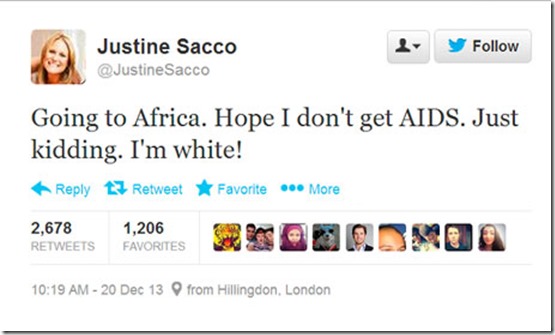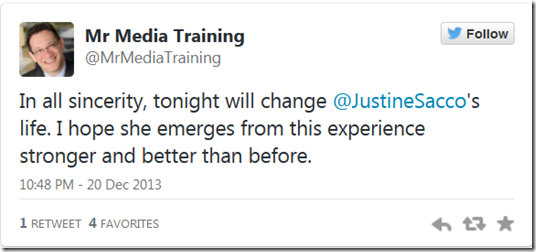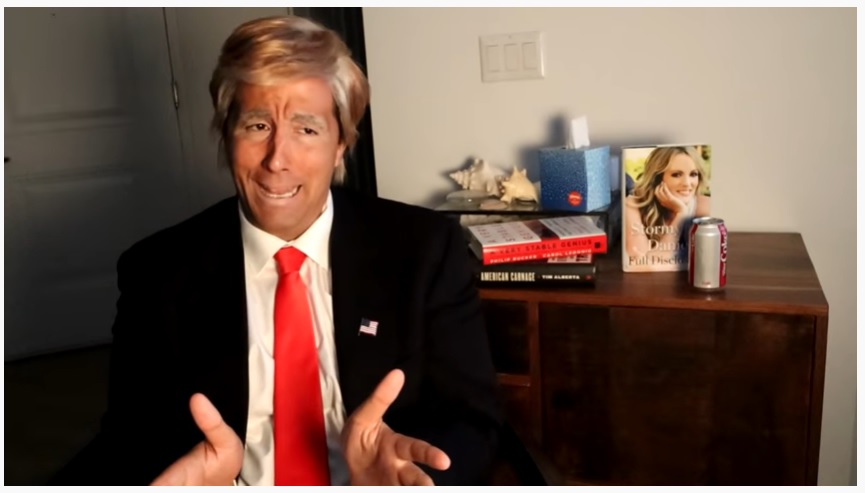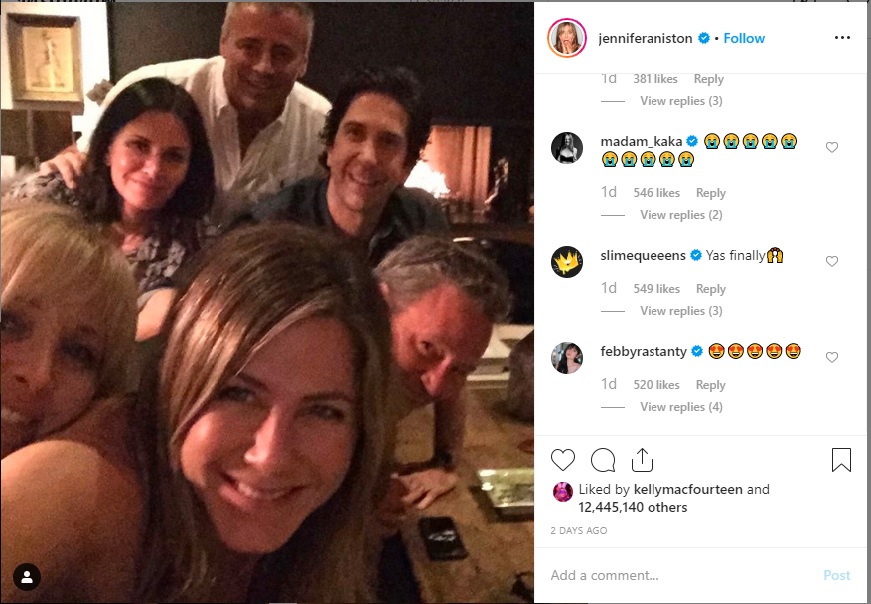What We Owe Justine Sacco
The most-viewed article on The New York Times website today is about Justine Sacco, the PR executive whose infamous tweet from December 2013 sent her life—and her career—into turmoil.
The article, titled “How One Stupid Tweet Blew Up Justine Sacco’s Life,” paints a sympathetic portrait of Sacco (and others) who have endured the painful wrath of online mobs.
As a reminder, the tweet above, sent to Sacco’s 170 Twitter followers prior to boarding an 11-hour flight without Wi-Fi, quickly became Twitter’s top trending topic. By the time she landed, she had become a source of outrage for some—but short-term amusement for many others.
Sacco says her tweet wasn’t meant to be taken literally: “Living in America puts us in a bit of a bubble when it comes to what is going on in the third world. I was making fun of that bubble.” Regardless of her intent (she had sent other insensitive tweets the same night), the Twitter mob had selected its target. And, as The New York Times contributor Jon Ronson writes, being the target of online rage comes at a steep cost:
“For the past two years, I’ve been interviewing individuals like Justine Sacco: everyday people pilloried brutally, most often for posting some poorly considered joke on social media. Whenever possible, I have met them in person, to truly grasp the emotional toll at the other end of our screens. The people I met were mostly unemployed, fired for their transgressions, and they seemed broken somehow — deeply confused and traumatized.”
A Problem of Proportionality
The issue, it seems to me, is one of proportionality. In a bygone era, similar comments overheard in an office hallway might have prompted a friendly boss to throw an arm around her shoulder and say, “Hey, I need you to cut that out.” But those same comments made publicly today can lead to a fierce and life-altering blowback that far exceeds the original grievance.
There’s value in society enforcing publicly accepted norms by holding people who violate them to account. But social media makes it too easy to turn an act deserving of a mild rebuke into a moment that turns the offender into an unemployed moral reprobate. Perhaps it’s reasonable to ask who among us could endure such scrutiny and make it out unscathed?
Was Justine Sacco An Appropriate Target?
My preference is to analyze and critique bigger targets, people who put themselves into positions of responsibility by choice. But occasionally, the unknown PR professional, random university student, or obscure business manager comes along and says or does something stupid. And I occasionally decide to write about that person.
The question, then, becomes whether I’m simply joining the large chorus of attack or writing something intended to be at least somewhat productive. As readers of this blog know, I succeed at that only some of the time.
Still, I aim to remain mindful of this brilliant monologue from comedian Craig Ferguson, who delivered these thoughts about choosing the “right” targets while Britney Spears was enduring her much-publicized breakdown.
To see if I met the “Craig Ferguson Test,” I went back and looked at my Twitter timeline from the period when the Justine Sacco story broke. I was relieved to see that despite sending a few snarky tweets, I lived up to my standards for myself at least some of the time.
What Do We Owe The Justine Sacco’s Of The World?
If the first rule of media training is this:
“Don’t say anything you wouldn’t want published on the front page of tomorrow’s newspaper.”
Then perhaps the first rule of blogging and interacting on social media should be this:
“Don’t write anything about another person that you wouldn’t feel comfortable defending if you went to dinner with them tonight.”
I’d maintain that it’s okay to write, tweet, and post about Justine Sacco, or any of the other formerly anonymous people who committed dumb thoughts to paper (or Twitter). It’s okay to ask that they be held to some sort of account for their actions.
But I’d argue that we have also have an obligation to talk about these people with some measure of compassion. Perhaps we should allow the person to defend themselves before assuming the worst about them. And maybe we should pause to examine whether our online bloodlust is coming from a place of genuine outrage or cheap titillation. For if we don’t, we diminish ourselves.
What do you think? Please leave your thoughts in the comments section below.






I have a love/hate relationship with Twitter.
As a consumer of the product, I love it. I have to admit, the funny snarky comments make me giggle and I enjoy the quick easy witty one-liners.
But as a people responsible for managing social media accounts, I’m very leery about using to its full potential. Too often, I’ve seen the most innocuous tweets suddenly become the target of a mob attack. Single tweets, taken out of context, are a dangerous thing. The relative anonymity of Twitter makes it a volatile vehicle for messages.
I’m curious… what did you think of Ms. Sacco’s conclusion in The Times article that it would be best for anyone in her situation not to say nothing at all… that anything she said to defend herself worked against her, and that the less you say, the quicker it will blow over?
Hi Bob,
Thank you for your question and for reading.
It’s hard to answer that question in the abstract, because so many factors go into answering it. As an example, here are some questions I would have had to answer for myself if Ms. Sacco had called me the night of “the incident”:
1. If I put Ms. Sacco on television, will she come off as defensive or poised, traumatized or sympathetic?
2. If we do put her on television, will she do it with an American outlet, requiring her to do a remote-style interview, which many people do badly?
3. If an in-person interview is better, should she come back to the U.S. but leave the comfort of her family in South Africa?
4. Since it was just a few days before Christmas, should we let the story die of its own weight in a few days as people turn their attention to family?
5. Will anything she says fundamentally change the narrative people created about her, or just feed the flames?
In her case, she may have played it exactly right. But as a general principle, I disagree that it’s always best to say nothing — each case is different and requires its own evaluation.
Does that help?
Thank you,
Brad
Good points, thanks. In the past, I would never have advised that it’s best to say nothing, so it was interesting to read the perspective she gave in The Times. It’s remarkable how quickly things pass these days. For example, six months is now an eternity… so the Brian Williams situation will play out much differently that it would have just a few years ago.
The article fails to mention that the people who we see getting Twitter shamed have failed to obey Rule #2 and are themselves doing thing that, they “wouldn’t feel comfortable defending if [they] went to dinner” with the people they were talking about.
Part of her interview with Ronson she said, “I had no business commenting on the epidemic in such a politically incorrect manner on a public forum.”
“Politically Incorrect.” The current code word for “try to portray yourself as a victim after doing something blatantly racist/sexist/homophobic.” Apparently not ridiculing AIDS victims is simply too much a restriction on her personal liberties. The horror!
She thinks this is a matter of public perception, not that she did anything wrong. That’s why she’s so hated. And unless she fixes that she will remain seen as what she is, a clueless racist who slings slime at everyone else then gets angry when people react negatively.